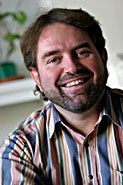Steering success: Roulet's challenge
Steering success: Roulet's challenge McGill University
User Tools (skip):
Steering success: Roulet's challenge
As Nigel Roulet settles himself into the director's office of the McGill School of Environment (MSE), he's confronted with a rather nice problem: success. The MSE has done so well in its first five years that it's just about at capacity in terms of the number of students. In 1998 there were 42 students, whereas today there are 277 in the bachelor's program.

Director of the McGill School of Environment Nigel Roulet
Owen Egan
So far, no one has been turned away from the multidisciplinary program which lies under the purview of the faculties of Arts, Science and Agricultural and Environmental Sciences. Roulet, professor of geography and member of the school's founding committee in 1997, is concerned that unless numbers are limited, the quality of the learning experience may suffer.
There is particular concern that the 400-level research course, one of the school's seven mandatory core courses, will suffer. The ideal number of six students per project, supervised by one professor, is now pushing eight.
"The problem is how to maintain the quality of teaching and of the practical project courses," says Roulet, who has been director of the MSE since the beginning of the month.
"Some of the core courses have as many as 200 students," he continues, emphasizing that this is only on the downtown campus. At the Macdonald Campus, where all the core courses are also offered, the classes are much smaller. The MSE encourages students to take as many of the core courses as possible at the Ste-Anne-de-Bellevue campus.
One bright light in the school's popularity conundrum is that MSE students can now graduate from the Macdonald Campus with a BSc (Agricultural and Environmental Sciences). Prior to this year a student could do all of their course work at Mac, yet not be able to graduate from that campus.
"This new BSc should increase growth potential at the Macdonald Campus," says Roulet.
While undergraduate enrolment will need no encouragement during Roulet's three-year mandate — which will last four years to accommodate a sabbatical — graduate enrolment is another question. At the moment, there are no graduate programs offered at the MSE (although graduate studies related to the environment abound at McGill), and this is something Roulet would like to change. He envisions a cooperative graduate program between the MSE and a particular department, akin to the Neotropical Environment Option, a joint graduate program offered by McGill and the Smithsonian Tropical Research Institute in Panama. There, students can pursue graduate degrees in disciplines in the arts or sciences, such as sociology, plant science and biosystems engineering.
As the MSE is an administrative and scholarly newcomer to the university, forging and maintaining partnerships between it and individual departments is key to the school's success in establishing itself. Aside from the support staff downtown and at Rowles House on the Macdonald Campus, no one at the MSE belongs solely to the school.
Roulet says that the 35 associate members of the MSE, the old guard that have a long history with the school as well as with their individual departments, "are particularly critical to the MSE's success because they bring their experience and their connections to their departments."
The 14 cross-appointed members, on the other hand, are younger and newer to McGill and "don't have lots of experience," says Roulet. He sees part of his job as helping the newcomers — who come from fields as diverse as religious studies, urban planning and anthropology — have their contribution recognized in both the school and their departments.
The MSE is not Roulet's first appointment as director of a unit. For six years he directed the multidisciplinary Centre for Climate and Global Change Research. Until taking the helm at the MSE, he was principal investigator of two research networks investigating the role of peatlands and forests in the earth's carbon cycle.
Roulet will continue to do research and to supervise graduate students while in his new post. Directing the MSE wasn't what he had in mind for the coming three years — in fact, he was on the search committee looking for a new director when the deans of the three faculties approached him for the job — but after rearranging his research commitments, he accepted the position philosophically.
"We need to take responsibility at different stages in our career for the governance of the community of scholars. If we don't, then non-academics will," says Roulet, who has been inspired by the recently published book, Academic Duty, by the president emeritus of Stanford University, Donald Kennedy.
Teaching, researching, writing, managing: Roulet acknowledges that these responsibilities will pose "a big challenge in managing time," but plans on coming to his MSE office each day while still getting out to do a few hours of research. His love of nature and concern for the state of the human and natural world that will be left to the next generation motivate his work in the field, the lab, the classroom and at the MSE.
